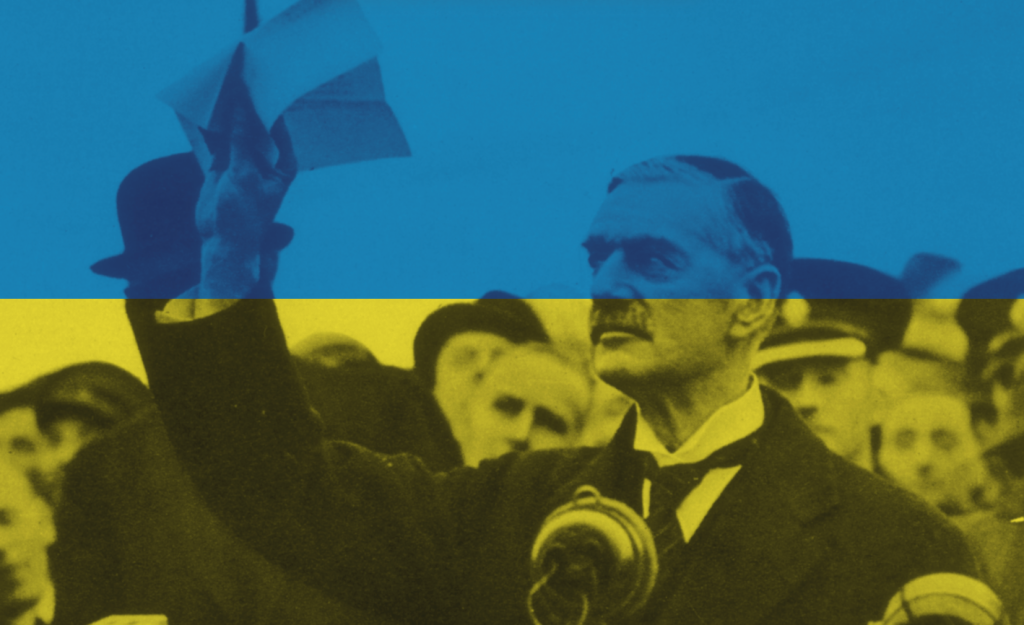

If Chamberlain was shortsighted, what are we?
The first time I wrote for Current about Russia’s war on Ukraine, a few weeks into the full-scale invasion back in 2022, I wrote about one specific historical parallel that could be drawn between Soviet Russia’s subjugation of Ukraine during and after World War II and Russia’s attempted subjugation of Ukraine today. In both, we see the use of public executions as a terror tactic.
I wrote that piece as rumors began to fly of Russian kill lists targeting Ukrainian civil leaders and other potential resistance figures. In the three years since, the rumors have firmed into grim reality. Among those who have been tortured and executed are not only POWs but town mayors, Orthodox priests and evangelical pastors, professional musicians, and children’s book writers, all targeted with the unmistakable genocidal intent of erasing an independent Ukrainian culture and identity.
Furthermore, just as I feared, the Russians have systematically used public executions to punish and terrorize. The only difference between Russia’s playbook in 1945 and in 2025 is that, thanks to the internet and smartphones, the perpetrators now have an audience for their terror on a scale the Soviet NKVD couldn’t possibly have imagined. Ukrainian POWs have been castrated, run through with swords, beheaded, or sometimes simply stripped naked and shot—all on camera. Horrific footage of tortured and executed Ukrainians is regularly uploaded for public viewing and sharing on Telegram and other platforms. The audience isn’t just the local village, forced at gunpoint to watch as in Soviet days, but all of social media.
The tactics are familiar; only the technology is new. Smartphones have made Russia’s war on Ukraine “the most intensively documented [war] in history.” This is, Felicia Wu Song argued at Current, the first TikTok War.
When I first began drafting this piece last week, world leaders were gathering in Munich for an annual security conference. My intent was to draw attention again to the obvious parallels between past and present. How could the West, and the U.S. in particular, make exactly the same mistakes with regard to Russia that we made in Munich in 1938 with regard to Nazi Germany, down to what seemed like the ignorant assumption that the aggressor wants peace as much as we do? (“He would tell me if he didn’t,” Trump assured us.) The evidence of Russia’s genocidal intent couldn’t be more readily available. How could we let ourselves be fooled again so easily?
It seems increasingly naïve to think that the Trump administration’s actions toward Ukraine and Russia can be explained away by naïveté or ignorance. Trump admires Putin as a dictator and wishes to be like him, and he has surrounded himself with men who are either power-hungry or morally weak. That’s the much simpler explanation for why his administration is holding talks with the aggressor over the head of the victim and has engaged in secret meetings to that end for months. The Trump administration has shut down a Justice Department task force targeting Russian oligarchs, announced that Ukraine’s future NATO membership is off the table and a return to its internationally recognized borders “unrealistic,” and demanded greater reparations from Ukraine, our ally, than we demanded from our enemy Germany at Versailles—all this before negotiations have officially opened.
“A quarrel in a faraway country between people of whom we know nothing”: So Neville Chamberlain infamously characterized Germany’s seizure of the Sudetenland in 1938. We shake our heads now at the shortsightedness; he was of course proven devastatingly wrong within a year. Ukraine has held on longer thanks only to the bravery and stubbornness of its own people. Its allies—even those not eager to appease Russia—have yet to find the will to act decisively and ensure Ukrainian victory. Practically speaking, what is the Russo-Ukrainian War to us but “a quarrel in a faraway country between people of whom we know nothing”—an abstraction, a rhetorical talking point?
If Chamberlain was shortsighted, what are we?
I used to think that the internet would make it increasingly difficult to perpetrate a genocide of twentieth-century proportions in the twenty-first. There would be too many witnesses, too many interconnected people all with the benefit of historical hindsight. But rather than rendering genocide impossible, access to the internet has only proven that we are fundamentally no different or better than the bystanders of Nazi Germany. We will always find ways to ignore atrocity and injustice—unless perhaps we can be shown that it benefits us immediately and tangibly to step in.
How could they have let it happen? we ask historians of World War II and the Holocaust. These people saw what was going on. They knew.
Look around. This is how.
Amanda McCrina is a writer, historian, and bookseller. She holds a degree in history and political science from the University of West Georgia. Her novels include Traitor, The Silent Unseen, I’ll Tell You No Lies, and the forthcoming Beyond Seven Forests (Lerner, 2026). She lives outside Nashville, Tennessee.
Amanda McCrina:
Thanks for your timely article “If Chamberlain was shortsighted — what are we?” published in Current. Many more of us need to express the deep concerns that you put into words.
I have not read your two works of fiction but am planning to get around to it in the coming months.
Sincerely
Richard Reitsma
Amanda McCrina: Thanks for your article about how we are as short sighted as Chamberlain. Many more of us need to put those thoughts into words. Richard Reitsma
If you’re wondering how it happened that the US switched from supporting Ukraine to aligning with Russia, let’s not forget all the folk who when given a choice choice between being the arsenal of democracy and being Chamberlain 2.0 in 2024, said, “Ehhh … I think I’ll vote for the American Solidarity Party.”